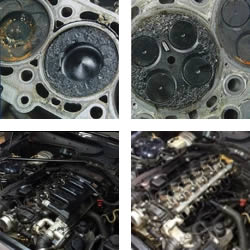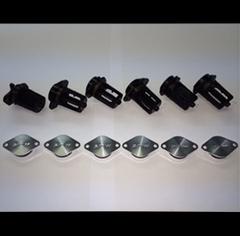BMW Swirl Flaps Information

We are all used to cherishing the notion of a perfect design from German car manufacturers. German car makers set the standard that others simply aspire to. Yet it comes as a surprise that the car giant BMW could get an engine design wrong?
The BMW diesel engines produced between 2000 and 2008 all have a particular design problem with inlet manifold butterfly flaps (commonly known as swirl flaps). Swirl flaps are used inside the inlet manifold of the BMW M47TU & M57TU diesel engines to vary the length of inlet manifold tract subject to load and anticipated demand. This allows optimum performance to be delivered (on a dynamometer!)
Back in 2000, BMW/Pierburg made a decision to manufacture diesel engine with swirl flaps made from steel. BMW swirl flaps commonly fail in such a way that they either: drop an affixing screw and or the upper section of the spindle. If this does not stop the engine, the remaining swirl flap falling completely into the engine will!
The outcome of such failure is not pretty in the slightest. Diesel engines cycle at a rate of at least 800 revs per minute at idle speed, so an ingested metal piece falling off the butterfly flap will be slammed by the moving internal components. Most often, one or more pistons end up severely damaged, along with several valves, an injector and the cylinder head, with possible collateral damage spreading to the turbo as well!
Around 2004, BMW addressed this fault - the swirl flaps supporting spindle was increased in size, along with the affixing screw diameter, though we have seen vehicles registered up to 2007 with the early type 22mm swirl flaps fitted. Despite the increased spindle diameter, we have seen and had numerous reports from customers all over the country of modified type swirl flap failure.
Luckily this problem is easy to correct by simply removing the swirl flaps. That means both inlet manifold tracts are constantly open. The result: no perceived difference in performance or fuel consumption and cleaner running due to the elimination of ‘dead spots’ in the inlet tract.
Once swirl flaps are removed, voids of 22mm or 32mm are left in the manifold. These voids need to be sealed, which is where PMW comes in - blanking plates CNC machined from super strong aircraft grade aluminum, fitted with new automotive grade ‘o’ rings.
Replacing swirl flaps is a fairly easy DIY job for a competent person with a reasonable selection of hand tools. Please find full instructions about fitting blanking plates in the article below. If you are not technically minded (or cannot be bothered!), you can bring your car into PMW in Chelmsford, Essex where we would be more than happy to carry out a pre-fitment diagnostic check and modification for you.
Please contact us to arrange an appointment: Our swirl flap modification costs from £193.68
Click here to view our Swirl Flap Guide (PDF format)
We can advise but not confirm that swirl flaps may be fitted to your vehicle. Please be aware that your vehicle may already have had the swirl flaps removed by the previous owner or may be fitted with a swirl flap free manifold or a redesigned manifold, which will mean that the blanking plates are not required. It is your responsibility, as the owner, to visually inspect the vehicle to confirm 100% that the swirl flaps are fitted, and that blanking plates are required. If you find the blanking plates are not required upon carrying out the modification, you can return both sets (at your cost) within 28 days. All Diesel BMWs built between 2003-2010 need to be visually inspected to confirm which size blanking plate is required. If you are not able to confirm which size blanking plate is needed, the option to purchase both sizes is available.
